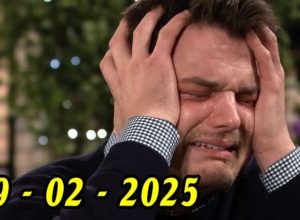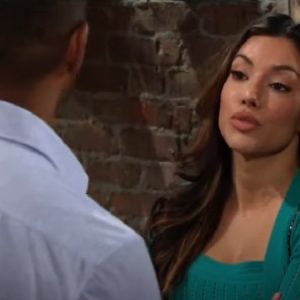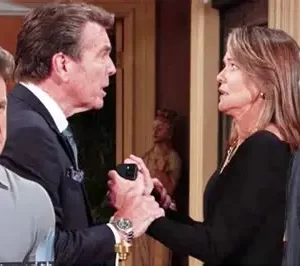The air in Paris was thick with perfume, secrets, and betrayal. Caine Ashby stood overlooking the Seine, watching guests arrive for what they thought was an elite business gala. For months, he’d held an incendiary truth about the Chancellor family, a secret that would shatter lives and rewrite the legacy of Jill Abbott Atkinson and Billy Abbott. Caine had always fiercely protected Jill; she’d treated him like family. But even the strongest bonds can break under the weight of long-held secrets.
Caine’s investigation began with casual discrepancies in estate documents, quickly spiraling into something deeply personal. Billy and Jill’s relationship was always turbulent, marked by Billy’s defiance against Jill’s controlling nature. Their battles were legendary. Jill blamed Billy’s recklessness, but Caine suspected something deeper, something unspoken in Jill’s eyes whenever Billy questioned his identity. This led Caine to discreetly gather medical records, birth certificates, and travel logs, culminating in a DNA test that confirmed the unimaginable: Billy Abbott was not John Abbott’s biological son. While this had been whispered before, the true father’s identity was now known, sending chills down Caine’s spine. It was dangerous. He knew exposing this truth would devastate Billy, destroy Jill’s credibility, and ignite a family war. Yet, Billy deserved to know the truth of his lineage, having lived under a false premise. Jill had denied him this truth while attempting to control him. Caine now had the power to reveal it, but at a cost.
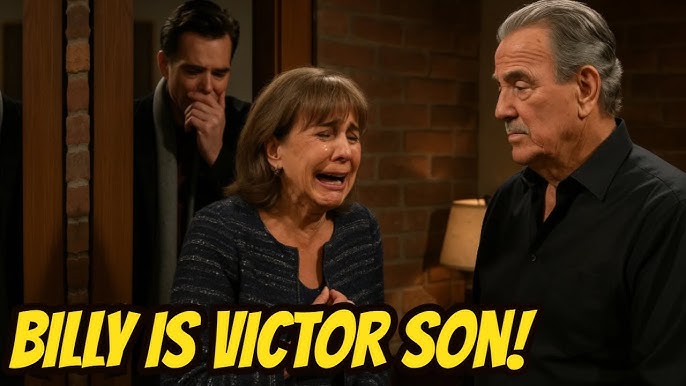
To ensure the truth couldn’t be ignored, Caine orchestrated a lavish Paris gathering. Jill, initially reluctant, was persuaded by Caine’s careful words and promise of discretion. She arrived, a grand matriarch, unaware her world was about to unravel. Caine watched her laugh and toast, completely oblivious. Then, just before dessert, Caine called for attention. The music stopped. He spoke of legacy and truth, then, before Jill, Billy, and Genoa City’s elite, produced the DNA results: a thick, symbolic envelope. He placed the thick, symbolic envelope beside Jill’s plate and met her gaze. Jill’s expression shifted from confusion to terror. Her hands trembled, but she didn’t open it. She knew. And for the first time in decades, she was truly afraid. Billy stood abruptly. “What is this?” he demanded. Jill’s silence was deafening.
Later, in a private room, Jill pleaded with Caine not to reveal the truth publicly. She confessed she kept the secret out of fear for Billy, believing he would spiral if he knew. Caine saw it as another manipulation. When the truth was finally revealed, it sent shock waves: Billy’s real father was a man long thought irrelevant to Genoa City history, a dark figure whose name brought shame and unresolved betrayal. Billy, now adrift, realized his entire life had been a lie. He wasn’t an Abbott, or even a Chancellor. He was something else entirely, something Jill had tried to bury. The fallout was swift. Billy withdrew, blaming Jill, hating Caine, and questioning every memory. His identity shattered, his relationships suffered. Jill faced public scrutiny and private isolation, having lost her son not to death, but to a decades-long lie. Cane felt no triumph; the truth he exposed had scorched everything around it. Jill retreated, diminished by guilt. She later told Cane, “You did what you thought was right… But some truths don’t set you free. They just take everything else away.” And perhaps she was right.
Billy stood in the ballroom, clutching the DNA results like a weapon. The world narrowed to his pounding heartbeat. He looked at the paper, then at Jill, his mother, his liar. He no longer knew who he was. Jill stood frozen, her elegant composure shattered, tears streaming. “Why now, Caine?” she sobbed. Caine didn’t answer. The damage was done. Billy’s hands shook as he reread the paper. The words were clear, the match irrefutable. The man he had hated for decades, Victor Newman, was his biological father. Victor stood speechless, his face flickering with fear or guilt. He slowly approached Jill. “You knew,” he said, his voice brittle. “You knew, and you never told me.” Jill broke down, crying, “You don’t understand… It was a different time. You had your empire, your family… I didn’t want to complicate it. Billy already had enough confusion.” “What good?” Victor echoed. “He’s my son!” “He’s John Abbott’s son!” Jill snapped back, her grief turning to rage. “In every way that matters. He was raised by the Abbotts.” Victor clenched his fists, then turned to Billy. Billy stood frozen, the paper crumpled. The entire framework of his life had collapsed. All his hatred for Victor, the rivalry, the accusations—it had all been a cruel joke. Jill stepped forward, desperate. “Billy, please, you’re still you. You’re still my son. This doesn’t have to change anything.” Billy slowly turned to her. “Doesn’t it?” he asked, his voice hollow. “It changes everything.” His eyes burned with dangerous grief and betrayal. He turned and walked out. Victor stopped Jill. “Let him go. He needs to figure this out on his own.”
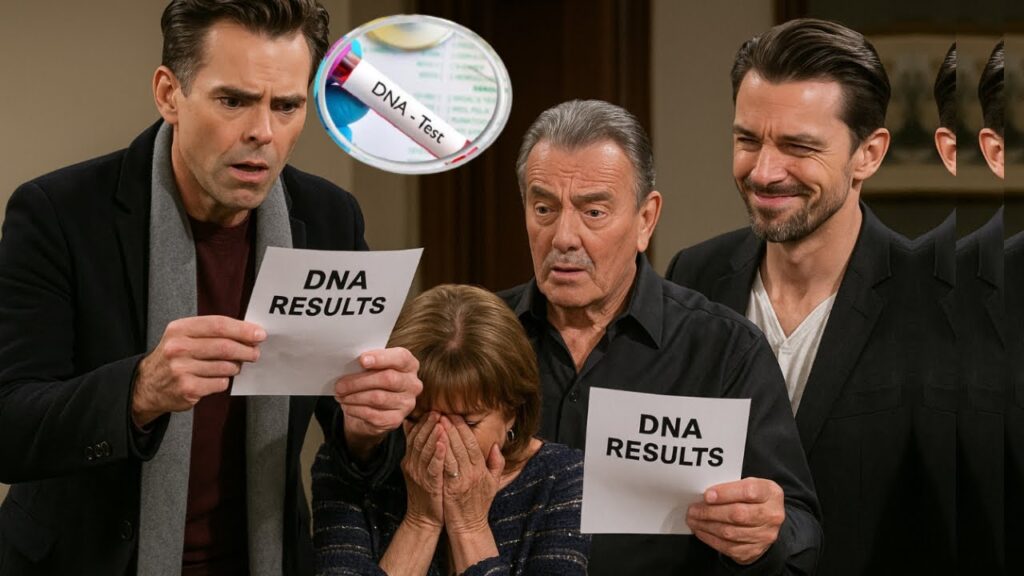
Later, Victor stood alone. He prided himself on control, but this revelation cut through him. Jill had robbed him of decades with his son. What was he to do? Billy was rebellious, flawed, dangerous—too much like him. Elsewhere, Jill broke down, clutching an old photo of Billy, whispering apologies. Cane stared at the fallout he caused, feeling righteous yet wondering if he went too far. Billy sat by the river, numb. His whole life was a lie. The man he loved wasn’t his father. The man he despised was. His mother, his greatest betrayer. By morning, news leaked. Victor’s name was whispered with Billy’s. Jabot was in limbo. Billy didn’t answer Jill’s calls. When Victor reached out, it was with a message: “We need to talk. This changes everything.” Billy didn’t reply. He wasn’t ready. Time is never a luxury in Genoa City; it’s a countdown.
The revelation of Aristotle Dumas’s true identity had electrified the Paris gala. Caine Ashby stood unmasked, but this was merely the opening move of a far more complicated game. Alliances would shift, power would be tested. Cane’s ambitions hadn’t changed; he was simply igniting the next phase of his strategy. He promised every guest a private meeting, answering questions and offering opportunities. Cane knew that in a world built on secrets, knowledge was currency. His private suite door opened to Jack Abbott. Jack entered, his calm masking a firestorm. The Abbott family had long been at war with the Newmans. Jack had weathered it all, and now Cane, supposedly a new man, was promising allegiance. Jack wasn’t buying it.
Cane gestured to a seat. “I know you don’t trust me,” he began. “Frankly, I wouldn’t either. But I’m not here to feed you lies. I’m here to tell you exactly where I stand. I’m not with Victor. I’ve played my part in the games, yes, but I’m not on his side. Not now. Not ever again. That chapter is over.” Jack tilted his head. “You expect me to believe that after everything?” “I expect you to listen,” Cane replied. “Because what I’m offering benefits both of us. You want Jabot to thrive. You want Newman weakened. I want Chancellor back. And together we can do both.” Jack considered it. The proposition wasn’t absurd. It was dangerous, risky, but had merit. If Cane was truly stepping away from Victor, there might be something to gain. But trust wouldn’t come easily. Cane laid out his plan: restructuring Chancellor’s Board, strategic investment for Jabot’s next product launch, undermining Newman’s European hold. It was bold, brilliant, in line with Cane’s new persona—a kingmaker. Jack didn’t make a decision, but he didn’t reject the offer. To Cane, that was a victory.
Not everyone was open to reconciliation. Michael Baldwin watched, unsure about his private meeting. Once a staunch ally of Victor Newman, Michael felt adrift, cut off, discarded. With Cane’s star rising, Michael wondered if there was a place for him. Cane anticipated this. When Michael entered, Cane greeted him not as an adversary, but as a man loyal to the wrong king. “You’re not with Victor anymore,” Cane said. “That makes you interesting.” “That makes me cautious,” Michael replied. “But you’re also a realist. And realists don’t cling to men who’ve stopped valuing their counsel. Victor cut you loose the moment your voice stopped echoing his own. I won’t do that.” Michael raised an eyebrow. “And what would you have me do?” “Help me reshape Chancellor—quietly, legally, strategically,” Cane replied. “And when the time is right, help me ensure that Victor can’t interfere ever again.” It was a proposition laced with implication: revenge, legacy, control. Michael, drawn to power, left without confirming, but the silence was heavy with possibility.
Cane’s strategy continued to unfold. Guests whispered of his confidence, his control, the strange calm now that his mask was dropped. But few understood the truth: this isn’t the real Cane Ashby. This is a reinvention, a fusion of everything he learned from Victor, Jill, Tucker, and Catherine. A man who decided surviving was no longer enough; he wanted to rule. Yet in the shadows, not everyone was convinced. Jack had started pulling files on Cane’s European subsidiaries. Michael tasked someone with reviewing the paper trail left by Aristotle Dumas’s shell companies. And Victor, outwardly composed, had ordered surveillance on Cane’s communications. No one believed this was simply a new business venture. Deeper motives, buried secrets, Cane knew. He wanted them to dig, because the deeper they looked, the more they would find only what Cane wanted them to see: carefully planted misleads, strategic falsehoods, a trail of bait leading them further from the truth he kept locked away. The real plan, the one even Jack or Michael couldn’t imagine, was still to come. And that plan required chaos. Cane wasn’t just playing both sides anymore; he was dismantling the board itself. As the night faded, the Paris estate returned to quiet grandeur, but the echoes of Cane’s words lingered. In Genoa City, the ripples had already begun. Jack returned to Jabot with cautious intrigue. Michael stood in his office, staring at a contract that could change his future.
